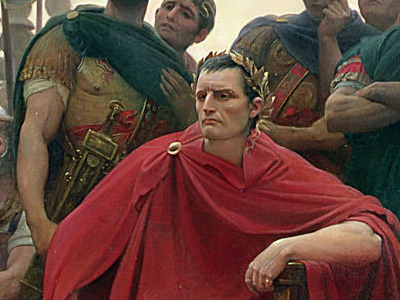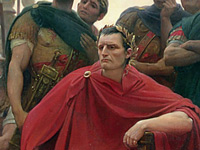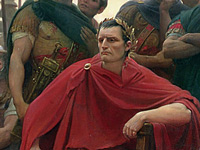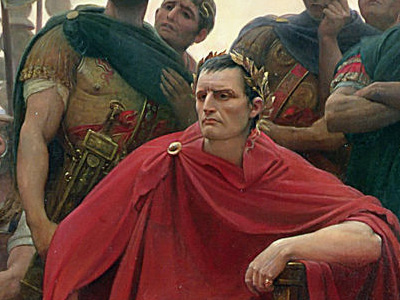Julius Caesar (100-44 BC)

Dictatorship
While he was still campaigning in Spain, the Senate began bestowing honours on Caesar. Caesar had not proscribed his enemies, instead pardoning almost all, and there was no serious public opposition to him. Great games and celebrations were held in April to honour Caesar’s victory at Munda. Plutarch writes that many Romans found the triumph held following Caesar's victory to be in poor taste, as those defeated in the civil war had not been foreigners, but instead fellow Romans. On Caesar's return to Italy in September 45 BC, he filed his will, naming his grandnephew Gaius Octavius (Octavian, later known as Augustus Caesar) as his principal heir, leaving his vast estate and property including his name. Caesar also wrote that if Octavian died before Caesar did, Decimus Junius Brutus Albinus would be the next heir in succession. In his will, he also left a substantial gift to the citizens of Rome.
During his early career, Caesar Julius Caesar (100-44 BC), was a Roman politician and general who played a critical role in the events that led to the demise of the Roman Republic and the rise of the Roman Empire. Caesar is considered by many historians to be one of the greatest military commanders in history. Julius Caesar » had seen how chaotic and dysfunctional the Roman Republic had become. The republican machinery had broken down under the weight of imperialism, the central government had become powerless, the provinces had been transformed into independent principalities under the absolute control of their governors, and the army had replaced the constitution as the means of accomplishing political goals. With a weak central government, political corruption had spiralled out of control, and the status quo had been maintained by a corrupt aristocracy, which saw no need to change a system that had made its members rich.
Julius Caesar (100-44 BC), was a Roman politician and general who played a critical role in the events that led to the demise of the Roman Republic and the rise of the Roman Empire. Caesar is considered by many historians to be one of the greatest military commanders in history. Julius Caesar » had seen how chaotic and dysfunctional the Roman Republic had become. The republican machinery had broken down under the weight of imperialism, the central government had become powerless, the provinces had been transformed into independent principalities under the absolute control of their governors, and the army had replaced the constitution as the means of accomplishing political goals. With a weak central government, political corruption had spiralled out of control, and the status quo had been maintained by a corrupt aristocracy, which saw no need to change a system that had made its members rich.
Between his crossing of the Rubicon in 49 BC, and his assassination in 44 BC, Caesar established a new constitution, which was intended to accomplish three separate goals. First, he wanted to suppress all armed resistance out in the provinces, and thus bring order back to the Republic. Second, he wanted to create a strong central government in Rome. Finally, he wanted to knit together all of the provinces into a single cohesive unit.
The first goal was accomplished when Caesar defeated Pompey and his supporters. To accomplish the other two goals, he needed to ensure that his control over the government was undisputed, so he assumed these powers by increasing his own authority, and by decreasing the authority of Rome's other political institutions. Finally, he enacted a series of reforms that were meant to address several long-neglected issues, the most important of which was his reform of the calendar.
Dictatorship
When Caesar returned to Rome, the Senate granted him triumphs for his victories, ostensibly those over Gaul, Egypt, Pharnaces, and Juba, rather than over his Roman opponents. Not everything went Caesar's way. When Arsinoe IV, Egypt's former queen, was paraded in chains, the spectators admired her dignified bearing and were moved to pity. Triumphal games were held, with beast-hunts involving 400 lions, and gladiator contests. A naval battle was held on a flooded basin at the Field of Mars. At the Circus Maximus, two armies of war captives, each of 2,000 people, 200 horses, and 20 elephants, fought to the death. Again, some bystanders complained, this time at Caesar's wasteful extravagance. A riot broke out, and only stopped when Caesar had two rioters sacrificed by the priests on the Field of Mars.
After the triumph, Caesar set out to pass an ambitious legislative agenda. He ordered a census be taken, which forced a reduction in the grain dole, and decreed that jurors could only come from the Senate or the equestrian ranks. He passed a sumptuary law that restricted the purchase of certain luxuries. After this, he passed a law that rewarded families for having many children, to speed up the repopulation of Italy. Then, he outlawed professional guilds, except those of ancient foundation, since many of these were subversive political clubs. He then passed a term-limit law applicable to governors. He passed a debt-restructuring law, which ultimately eliminated about a fourth of all debts owed.
The Forum of Caesar, with its Temple of Venus Genetrix, was then built, among many other public works. Caesar also tightly regulated the purchase of state-subsidised grain and reduced the number of recipients to a fixed number, all of whom were entered into a special register. From 47 to 44 BC, he made plans for the distribution of land to about 15,000 of his veterans.
The most important change, however, was his reform of the calendar. The calendar was then regulated by the movement of the moon, and this had left it in a mess. Caesar Julius Caesar (100-44 BC), was a Roman politician and general who played a critical role in the events that led to the demise of the Roman Republic and the rise of the Roman Empire. Caesar is considered by many historians to be one of the greatest military commanders in history. Julius Caesar » replaced this calendar with the Egyptian calendar, which was regulated by the sun. He set the length of the year to 365.25 days by adding an intercalary/leap day at the end of February every fourth year.
Julius Caesar (100-44 BC), was a Roman politician and general who played a critical role in the events that led to the demise of the Roman Republic and the rise of the Roman Empire. Caesar is considered by many historians to be one of the greatest military commanders in history. Julius Caesar » replaced this calendar with the Egyptian calendar, which was regulated by the sun. He set the length of the year to 365.25 days by adding an intercalary/leap day at the end of February every fourth year.
To bring the calendar into alignment with the seasons, he decreed that three extra months be inserted into 46 BC (the ordinary intercalary month at the end of February, and two extra months after November). Thus, the Julian calendar opened on 1 January 45 BC. This calendar is almost identical to the current Western calendar.
Shortly before his assassination, he passed a few more reforms. He established a police force, appointed officials to carry out his land reforms, and ordered the rebuilding of Carthage and Corinth. He also extended Latin rights throughout the Roman world, and then abolished the tax system and reverted to the earlier version that allowed cities to collect tribute however they wanted, rather than needing Roman intermediaries. His assassination prevented further and larger schemes, which included the construction of an unprecedented temple to Mars, a huge theatre, and a library on the scale of the Library of Alexandria.
He also wanted to convert Ostia to a major port, and cut a canal through the Isthmus of Corinth. Militarily, he wanted to conquer the Dacians and Parthians, and avenge the loss at Carrhae. Thus, he instituted a massive mobilisation. Shortly before his assassination, the Senate named him censor for life and Father of the Fatherland, and the month of Quintilis was renamed July in his honour.
He was granted further honours, which were later used to justify his assassination as a would-be divine monarch: coins were issued bearing his image and his statue was placed next to those of the kings. He was granted a golden chair in the Senate, was allowed to wear triumphal dress whenever he chose, and was offered a form of semi-official or popular cult, with Mark Antony as his high priest.
HISTORY

RESOURCES
This article uses material from the Wikipedia article "Julius Caesar", which is released under the Creative Commons Attribution-Share-Alike License 3.0.
© Stories Preschool. All Rights Reserved.









